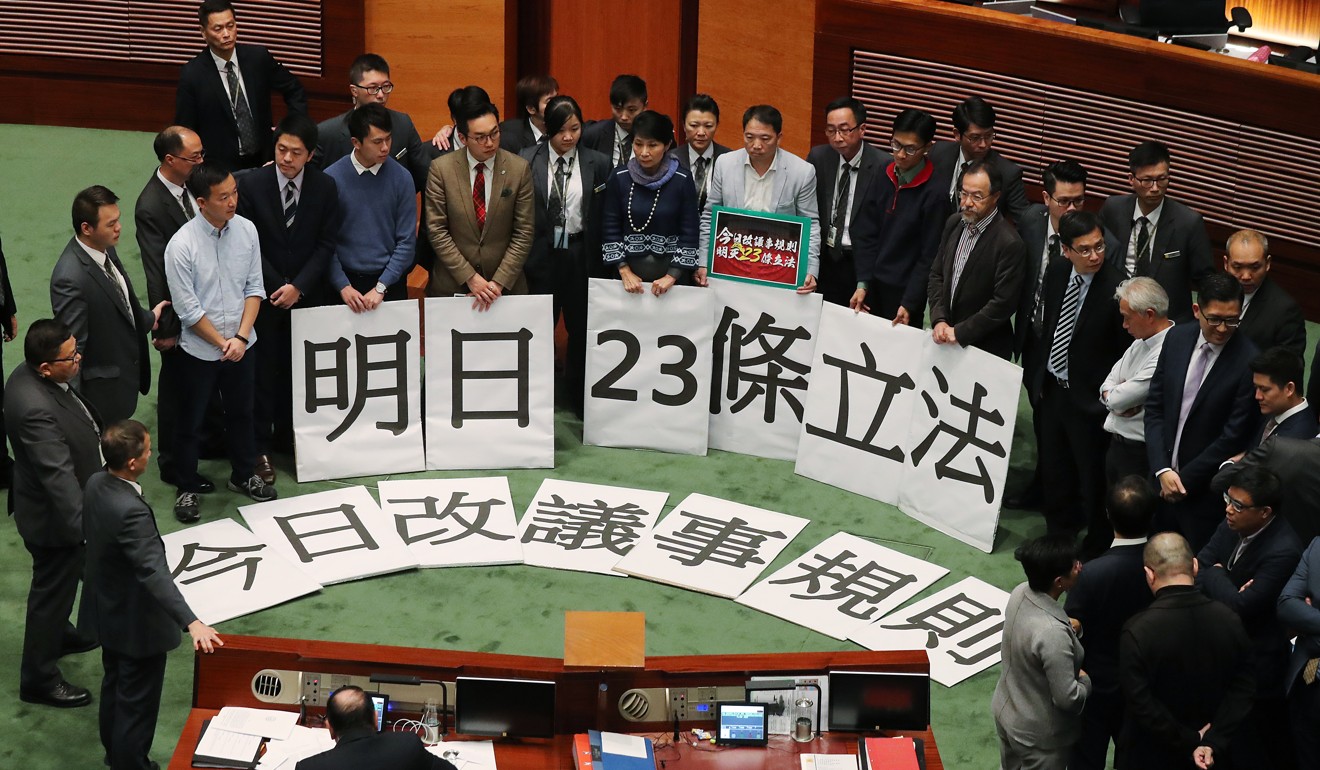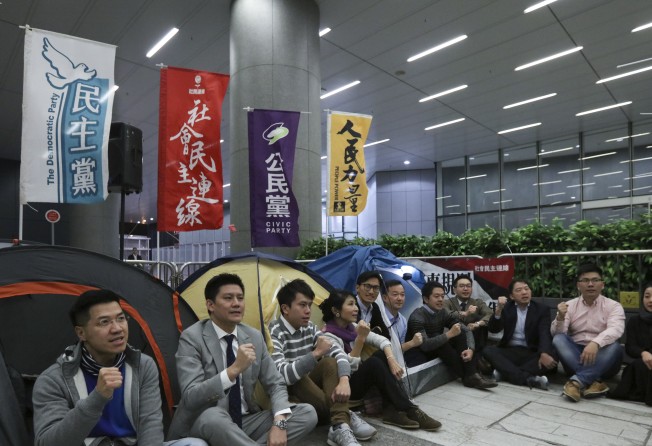
Showdown in Legco over changes to its rule book: What’s fuelling the continuing clash?
One side wants to curb filibustering while the other says changes will limit its ability to properly represent Hongkongers.

Colourful tents set up by protesters and metre-high metal fences last used to restrain demonstrators during the pro-democracy Occupy protests of 2014 have appeared outside Hong Kong’s legislature in Admiralty this week, amid an ongoing clash between lawmakers on proposed changes to the rule book.
If passed, the amendments would be the most significant changes to the Rules of Procedure in decades.
Pro-establishment lawmakers moved the amendments on Thursday, and these could be endorsed by Friday evening at the earliest.
The opposition pro-democracy bloc has vowed to fight tooth and nail to block the changes, with supporters camping outside the Legco complex, and legislators making a last-ditch attempt to drag out the debate in the chamber.
Lawmaker Shiu Ka-chun, representing the social welfare sector, turned on a personal attack alarm during his speech on Thursday. It generated a loud beeping sound, and eventually forced a suspension of the meeting for almost 10 minutes.
Meanwhile, some 35 civil society groups and activists have banded together to protest the rule changes, which they said would weaken the legislature’s power to monitor the government. This came after thousands of people signed a petition launched by 29 academics objecting to the changes.
Here is why the amendments are so contentious.
1. Why are lawmakers butting heads over the proposed changes?
Sick of the filibustering that has led to constant gridlock in Legco, the pro-establishment bloc tabled 24 proposals to amend the rules of procedure.
If passed, the amendments would put an end to the opposition’s repeated calls for quorum counts, lengthy speeches and tabling stacks of amendments to any bill or motion.
Pro-establishment lawmakers, many of whom are Beijing-friendly, see this as a now-or-never opportunity to engineer a change in Legco, given that the veto power wielded by the pro-democracy camp in Legco was significantly weakened after a court disqualified six pan-democrat lawmakers for improper oath-taking last year. The 70-member council is now down to 64 members, the bulk of whom support the establishment.
Pan-democrats want to drag out the discussion, at least until the by-election on March 11 next year where they have a chance to win back some of the seats.
But on Monday, Legco president Andrew Leung Kwan-yuen, of the pro-establishment camp, gave a clear indication that he intended to wrap up the matter by Christmas, by ordering additional meetings to be held to debate the amendments.
The city’s leader Carrie Lam Cheng Yuet-ngor, rejecting calls to mediate tensions, was accused of smoothing for the other side’s path to success by not tabling any bills for discussion at recent council meetings.
2. What exactly do pan-democrats find unacceptable?
The pan-democrats warn that the changes would allow the government to bulldoze through “draconian” legislation. They are frustrated that Hongkongers do not seem to realise how the changes could limit their political rights.
Indeed, some of the amendments would restrict how far opposition lawmakers can go in pressuring the government to back down on unpopular policies.
One seeks to reduce the quorum from 35 – or half of all members – to 20 when council meetings focus on scrutinising bills, as lawmakers are allowed to give an unlimited number of speeches.
Another change is to grant the Legco president the power to convene a session to complete a meeting adjourned for a lack of quorum any time before the next scheduled Legco session, limiting the effect of stalling by the opposition.

But what they find most offensive is the suggestion to tighten rules on convening a select committee to probe government officials on their actions, such as when pan-democrats launched an investigation into the HK$50 million payment received by former Chief Executive Leung Chun-ying from Australian firm UGL.
Currently, a petition signed by 20 lawmakers is needed to set up a select committee. The change will require 35 lawmakers – or half the council’s membership – to back the bid.
On Wednesday, the pro-democracy bloc attempted to showcase the benefits of the existing petition rule by setting up two select committees to probe hot-button local issues.
Finally, there are fears that with the changes, the government will bulldoze through a contentious national security bill to prohibit treason, secession, sedition and subversion against China.
Article 23 of the Basic Law requires Hong Kong to do this, but the government shelved an attempt in 2003 when half a million Hongkongers took to the streets in protest.
While Lam said the government would never “do anything to hurt Hongkongers”, pressure from Beijing is increasing.
Pan-democrats say the current electoral system makes it impossible for them to secure a majority in the legislature, as half of the 70 seats are not directly elected but returned by a small group of elites representing different trades and businessmen.
Thus, the opposition cannot reject any government bills that require only a simple majority to be passed. With the changes, minority voices would be further silenced.
3. What’s been the impact of filibusters and have they forced the government to back down?
Not all pan-democrats agree with the frequent use of filibusters and most filibustering attempts have been in vain, given the Legco president’s power to cut short debates.
But at least one bill was shelved as a result of this tactic. Last year, the government decided to abandon the copyright amendment bill, termed by angry internet users as “internet Article 23” in reference to the reviled national security legislation, after pro-democracy lawmakers united to stage weeks of marathon debate.
However, most of the quorum calls and meeting adjournments have only caused frustration. A record high of 596 calls for quorum counts were made during the 2015/16 Legco sessions, halting meetings for 115 hours in all. If a quorum is not met after the bell is rung for 15 minutes, the meeting will be adjourned until the next sitting.
Pan-democrats used filibusters during the debate on funding for the high-speed rail link to the mainland in 2009. The more radical ones among them began deploying the same tactic from the 2013 budget debate, though they also did so a year earlier in a debate on Hong Kong’s old age living allowance.
Yet most traditional pan-democrats only want the tactic to be used as a “weapon” of last resort to block laws that they believe will hurt Hong Kong and its citizens.
4. Have the pro-establishment camp also resorted to filibusters?
Yes. In 1999, as Legco scrutinised the Provision of Municipal Services (Reorganisation) Bill, which would effectively dissolve the two provisional municipal councils, the pro-establishment camp dragged out the debate to allow them to collect “yes” votes.
Then a lawmaker and member of the camp, Lau Kong-wah, who is now the Secretary for Home Affairs, acknowledged the value of filibustering in his speech.
“[Filibustering] is a tactic. It is totally acceptable in a parliamentary assembly,” Lau said in 1999 according to the Legco’s Hansard.
5. Is filibustering unique to Hong Kong politics?
Definitely not. As it happens wherever minority parties try to prevent legislation from being brought to a vote, most notably in the US Senate.
US Senator Strom Thurmond used to hold the record for the longest filibuster, when he spoke for 24 hours and 18 minutes straight in an effort to block the Civil Rights Act of 1957.
He took a steam bath beforehand and brought a sirloin steak onto the stage.
Last year, 38 South Korean opposition legislators set a new world record by jointly completing a 192-hour talkathon against the Anti-Terrorism bill, which they believed would threaten personal freedom. Lasting for nearly nine days, their speeches included passages from George Orwell’s classic dystopian novel 1984.
6. Where did the word “filibuster” come from?
According to the Oxford dictionary, the term comes from the French word flibustier, used in the late 18th century to describe pirates who pillaged Spanish colonies in the West Indies. In the mid 19th century, the term was used on American adventurers who incited revolution in Latin American states. It was eventually adopted to describe tactics aimed at sabotaging senate business.
Additional reporting by Yujing Liu